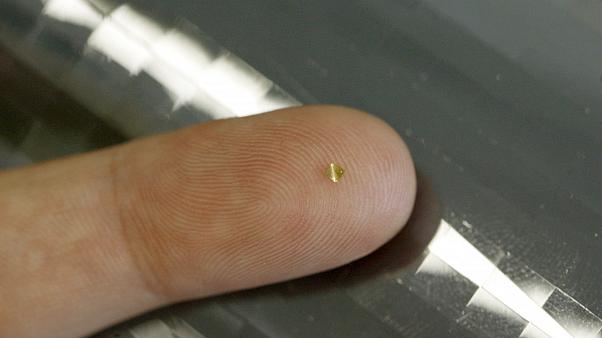Coming to mind here is the transhumanist movement, or, more precisely, the so-called morphological freedom, which is the right to modify your body in whatever way you want, so long as your action doesn’t hurt anybody else. But the current trend of implanting computer chips under the human skin goes far beyond the transhumanist movement. Moreover, application-based chip implants are basically Near-Field Communication-(NFC-)powered multipurpose key/credit card/identification tools that a few companies in the US, and particularly in Sweden, are seeing as the future.
One of these companies is Third Square Market (TSM), based in Wisconsin, USA, who, barely two years ago, began asking its employees to implant a computer chip into the flesh between the thumb and the index finger. About the size of a grain of rice, the microchips, which are essentially cylindrical bar codes, are typically inserted into the skin in seconds, via a slightly oversize syringe, like that used for giving vaccinations. The procedure could cost anywhere between $50 and $200, depending on the features and capabilities of the chips.
One of the first major newspaper articles on under-skin chip implants appeared in The New York Times of 13 October 2004, with Barnaby Feder as the author. It reports on the approval by the US Food and Drug Administration (FDA) of implantable chips produced by Applied Digital Solutions (ADS), a Delray, Florida, USA-based company. The ADS chip, which is called VeriChip, is for providing easy access to individual medical records. The ADS at the time said that its devices “could save lives and limit injuries from errors in medical treatment.” According to Feder, “In Applied Digital’s vision, patients implanted with the chips could receive more effective care because doctors, emergency room personnel and even ambulance crews equipped with Applied’s handheld radio scanners would be able to read a unique 16-digit number on the chip.” The technology is based on radio frequency identification (RFID), on which this column in Daily Trust has written a few articles a few years ago.
In those primitive days of the technology (in 2004), the chips did not contain any records, “but with the number, the care provider would be able to retrieve medical information about blood type, drug histories and other critical data stored on computers.” The RFID-based tags have been embedded in livestock and pets by the millions since the past few decades, as a more secure form of identification compared to external tags.
Today, the under-skin microchips are much more powerful, and can be used in numerous applications, including medical, security, and financial. In specifics, we can identify the following uses. Cochlear implants help the deaf to hear. In Sweden, implants are used to gain access to working spaces, pay for gym memberships, and ride government trains. According to Oscar Schwartz (The New York Times of 8 November 2019), “microchip implants are essentially cylindrical bar codes that, when scanned, transmit a unique signal through a layer of skin. Mostly, they have been used to organize products or warehouses or identify livestock and stray pets, though there has been some human experimentation.” At Epicenter, a tech-focused co-working space in Stockholm, Sweden; geeks open the front door and print documents with the implants.
Jowan Österlund, a Swedish tattooist and body piercing specialist whose company Biohax provides TSM with the microchips, is optimistic, and is offering an alternative to the seemingly endless collection of passwords, keys, tickets, and cards that clutter our lives. “With the chip, it’s all in this one tiny device that is impossible to lose,” Österlund said. Hannes Sjöblad, a friend of Österlund, who was once associated with the transhumanist community in Sweden, is equally excited about under-skin implants. According to Schwartz, Sjöblad’s business, Dsruptive, which is based out of a university in southern Sweden, “approaches microchipping as an extension of the wearable health tracking industry.” “Sjöblad believes that by placing a device under the skin, instead of wearing it like a Fitbit, data collection will be greatly improved.” “Swipe it with an iPhone and you will be able to get your blood oxygenation, temperature profile, heart rate patterns, breathing patterns,” Sjöblad is quoted as saying.
There are other use cases for the technology, such as storing emergency contact details, social media profiles or e-tickets for events and transportation. Todd Westby, CEO of TSM, was quoted by Eric Mack in Forbes Magazine in 2017 as saying “Eventually, this technology will become standardized allowing you to use this as your passport, public transit, all purchasing opportunities, etc.”
“Getting-chipped,” or the act of having microchips inserted under your skin, is even becoming a fad in Sweden, a country known for radical technology innovations, where Skype and Spotify were originally developed. Today, Sweden might as well be the world leader in under-skin implants for non-medical purposes.
Is everyone beating a path to the under-skin microchip implant technology? Not yet. There is the creepy factor associated with inserting stuff under your skin for non-medicinal purposes and concerns by religious people, not to mention security and privacy concerns. Ifeoma Ajunwa, a professor at Cornell University, Ithaca, New York, USA, reportedly contributed to the discussions on the issues recently. Regulations are probably on the way, too.

 Join Daily Trust WhatsApp Community For Quick Access To News and Happenings Around You.
Join Daily Trust WhatsApp Community For Quick Access To News and Happenings Around You.


